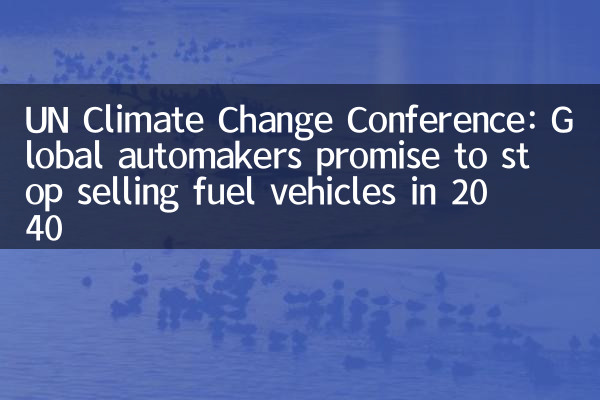UN Climate Change Conference: Global automakers promise to stop selling fuel vehicles in 2040
Recently, a major news came out at the United Nations Conference on Climate Change (COP28): Major automakers around the world jointly promised to gradually stop selling fuel vehicles by 2040 to cope with the increasingly severe climate change problem. This commitment marks a key step towards carbon neutrality in the global transportation industry, and has also triggered extensive discussions among all sectors of society on new energy technology, infrastructure construction and policy support.
1. Commitment and participation list of global auto companies

The following are the major automakers and their target years that have publicly promised to join the plan to discontinue fuel vehicles:
| Car company name | Target year for discontinuing fuel vehicles | Main markets |
|---|---|---|
| Volvo | 2030 | worldwide |
| Ford | 2035 | Europe |
| General Motors | 2035 | North America |
| Mercedes-Benz | 2030 | Main markets |
| Toyota | 2040 | worldwide |
It is worth noting that some car companies such as Tesla and BYD have achieved pure electrification transformation ahead of schedule, while traditional fuel vehicle giants such as Volkswagen and BMW have also announced phased goals, but have not clearly promised to completely stop sales in 2040.
2. Challenges and opportunities for stopping fuel vehicles
Although this commitment demonstrates the automaker's determination to reduce emissions, there are still multiple challenges to achieve its goals:
1.Technical bottleneck: The battery energy density, charging speed and cost issues still need to be broken through; 2.Insufficient infrastructure: The global charging pile coverage rate is uneven, and some developing countries are lagging behind; 3.Supply chain pressure: The supply of key raw materials such as lithium and cobalt is tight; 4.Consumer acceptance: Some markets still have concerns about the battery life and price of electric vehicles.
At the same time, this transformation also brings great opportunities:
| field | Potential growth points |
|---|---|
| New energy technology | Research and development of solid-state batteries and hydrogen fuel cells |
| Industrial chain | Battery recycling, smart grid construction |
| Job Market | New green energy jobs are estimated to exceed 10 million |
3. Global policy support and market response
Many governments have issued supporting policies to accelerate transformation:
• The EU passes the ban on fuel vehicles in 2035; • The United States launches the ban on inflation reduction bill to provide subsidies for electric vehicles; • China plans to account for more than 50% of new energy vehicles by 2035.
The capital market responded positively, with the average increase in the new energy sector in the past 10 days reaching 5.3%, while the stock prices of traditional fuel vehicle supply chain companies are under pressure. Environmental organizations generally welcome this commitment, but stressed the need for increased supervision to ensure implementation.
4. Future prospects
Experts pointed out that the suspension of fuel vehicles is only part of the emission reduction in the transportation field, and it also needs to combine systematic changes such as renewable energy power generation, urban planning and carbon trading mechanisms. UN Secretary-General Guterres called for: "The commitment in 2040 must be the starting point of action, not the end point." With the increase in technology iteration and policy efforts, the reshaping of the global transportation and energy structure is unstoppable.
How will this historic commitment change the way we travel? Can all countries work together to overcome the pain of transformation? In the next 20 years, the disruptive changes in the automobile industry deserve continuous attention.

check the details

check the details